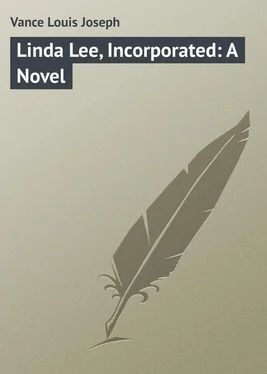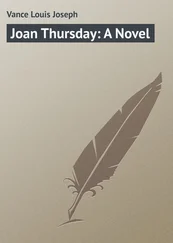Louis Vance - Linda Lee, Incorporated - A Novel
Здесь есть возможность читать онлайн «Louis Vance - Linda Lee, Incorporated - A Novel» — ознакомительный отрывок электронной книги совершенно бесплатно, а после прочтения отрывка купить полную версию. В некоторых случаях можно слушать аудио, скачать через торрент в формате fb2 и присутствует краткое содержание. Жанр: foreign_prose, на английском языке. Описание произведения, (предисловие) а так же отзывы посетителей доступны на портале библиотеки ЛибКат.
- Название:Linda Lee, Incorporated: A Novel
- Автор:
- Жанр:
- Год:неизвестен
- ISBN:нет данных
- Рейтинг книги:3 / 5. Голосов: 1
-
Избранное:Добавить в избранное
- Отзывы:
-
Ваша оценка:
- 60
- 1
- 2
- 3
- 4
- 5
Linda Lee, Incorporated: A Novel: краткое содержание, описание и аннотация
Предлагаем к чтению аннотацию, описание, краткое содержание или предисловие (зависит от того, что написал сам автор книги «Linda Lee, Incorporated: A Novel»). Если вы не нашли необходимую информацию о книге — напишите в комментариях, мы постараемся отыскать её.
Linda Lee, Incorporated: A Novel — читать онлайн ознакомительный отрывок
Ниже представлен текст книги, разбитый по страницам. Система сохранения места последней прочитанной страницы, позволяет с удобством читать онлайн бесплатно книгу «Linda Lee, Incorporated: A Novel», без необходимости каждый раз заново искать на чём Вы остановились. Поставьте закладку, и сможете в любой момент перейти на страницу, на которой закончили чтение.
Интервал:
Закладка:
On a modest set near at hand, apparently a bedchamber in a home of humble fortunes, a bored chambermaid in checked shirt and overalls, with a cigarette stuck behind his ear, was making up the bed.
In another quarter a number of workmen were noisily if languidly engaged in knocking down a built wall of real brick and lugging away sections of a sidewalk which had bordered it, light frames of wood painted to resemble stone.
At the far end of the room a substantial set represented a living-room that matched up with the bedchamber nearer at hand, or seemed to, for a good part of it was masked from Lucinda's view by a number of massive but portable metal screens or stands arranged in two converging ranks, at whose apex stood a heavy tripod supporting a small black box. To these stands lines of insulated cable wandered over the floor from every quarter of the room. Just back of the tripod several men were lounging, gazing off at the set with an air of listless curiosity. The spaces between the screens afforded glimpses of figures moving to and fro with, at that distance, neither apparent purpose nor animation.
Elsewhere about the studio, in knots, by twos and singly, some twenty-five or thirty men and women, mostly in grease-paint and more or less convincing afternoon dress, were lounging, gossiping, reading newspapers, or simply and beautifully existing.
An enervating atmosphere of apathy pervaded the place, as if nothing of much moment to anybody present was either happening or expected to happen. An effect to which considerable contribution was made by the lugubrious strains of a three-piece orchestra, piano, violin, and 'cello, stationed to one side of the living-room set.
At first sight this trio intrigued Lucinda's interest. To her its presence in a motion-picture studio seemed unaccountable, but not more so than patience with its rendition of plaintive and tremulous melodies of a bygone period, tunes which one more familiar with the cant of the theatre would unhesitatingly have classified as "sob stuff," and to which nobody appeared to be paying any attention whatever.
Mystified to the point of fascination, she studied the musicians individually.
The pianist, perched sideways on his stool and fingering the keyboard of an antique upright without once looking at the music on its rack, as often as not played with one hand only, using the other to manipulate a cigarette which he was smoking in open defiance of the many posted notices that forbade this practice.
The violinist, stretched out with ankles crossed, occupied a common kitchen chair which his body touched at two places only, with the end of his spine and the nape of his neck. His eyes were half-shut, his bowing suggested the performance of a somnambulist.
The 'cellist, too, seemed to be saved from falling forward from his chair solely by the instrument which his knees embraced. His head drowsily nodding to the time, the fingers of his left hand automatically stopped the strings at which his right arm sawed methodically. An honest soul, a journeyman who for a set wage had contracted to saw so many chords of music before the whistle blew and was honestly bent on doing his stint…
Mr. Lane, having excused himself for a moment, returned from consulting some member of the group round the tripod.
"'Sall right," he announced with a happy smile. "They won't begin shooting a while yet. You can come closer if you want, I'll show you where to stay so's you won't be in the way."
Guided by him, the exotics gingerly picked their way across the banks, coils, loops and strands of electric cable that ran in snaky confusion all over the floor, like exposed viscera of the cinema; and Lucinda presently found herself on the side lines of the living-room, between it and the dogged orchestra, and well out of range of the camera.
She could now see three people on the set, two men with a girl whom, thanks to the wide circulation of the lady's photographs, she had no difficulty in identifying as Alma Daley herself – a prepossessing young person with bobbed hair, a boldly featured face, comely in the flesh rather than pretty, and a slight little body whose emaciation told a tale of too-rigorous dieting and which she used not unpleasingly but with a rather fetching effect of youthful gaucherie. Her make-up for the camera was much lighter and more deftly applied than seemed to be the rule. Gowned effectively if elaborately in a street dress hall-marked by the rue de la Paix, she was leaning against a table and lending close if fatigued attention to the quiet conversation of the two men.
Of these one was tall and dark, with a thick mane of wavy black hair, a wide and mobile mouth, and great, melancholy eyes. His well-tailored morning-coat displayed to admiration a splendid torso. The other was a smaller, indeed an undersized man, who wore a braided smoking-jacket but no paint on his pinched, weather-worn face of an actor. His manner was intense and all his observations (and he was doing most of the talking) were illustrated by gesticulation almost Latin in its freedom and vividness.
"King Laughlin," Mr. Culp's secretary informed Lucinda – "man in the smoking-jacket, he always wears one when he's working – greatest emotional director in the business, nobody can touch him. Why, alongside him, Griffith's a joke in a back number of Judge. You wouldn't guess what he gets: thirty-five hundred."
"That's almost a thousand a week, isn't it?"
"Thousand a week !" Mr. Lane suspiciously inspected Lucinda's profile. Could it be possible that this well-born lady was trying to kid him? But no; he could see she was quite guileless. In accents of some compassion he corrected: "Three-thousand five-hundred every week's what King Laughlin drags down in the little old pay en vel ope. But that's Mr. Culp all over; expense's no object when he's making an Alma Daley picture, nothing's too good."
"I'm sure…" Lucinda agreed vaguely.
Out of the corner of an eye the director had become aware of a new audience and one worthy of his mettle, and he was already preparing to play up to it. Dropping the easy, semi-confidential manner in which he had been advising the younger and taller man, with surprising animation Mr. King Laughlin snatched a silk hat and stick from the other's unresisting hands.
"Right-O, Tommy!" he said in the nasal tone of the English Midlands. "I think you've got me now, but just to make sure I'll walk through it with Alma." He turned graciously to the woman: "Now, Alma dear…"
Miss Daley, herself not unconscious of a fashionable gallery, shrugged slightly to signify that she didn't mind if Mr. Laughlin thought it really worth while, it was all in the day's drudgery, and made a leisurely exit from the set by way of a door in its right-hand wall. At the same time Mr. Laughlin walked off by a door approximately opposite, and the young man in the morning-coat strolled down to the front of the set and settled himself to observe and absorb the impending lesson.
Mr. Laughlin then re-entered in character as a dégagé gentleman with an uneasy conscience, indicating this last by stealthily opening and peering round the edge of the door before coming in and closing it with caution, and gentility by holding hat and stick in one hand and carelessly trailing the ferrule of the stick behind him. Relieved to find the room untenanted, he moved up to the table, placed the hat on it crown-down, propped the stick against it, turned and gave the door in the right-hand wall a hard look, then bent over the table and pulled out and began to ransack one of its drawers. Thus engaged, he said clearly: " All right, Alma! " and immediately gave a start, whereby it appeared that he had heard footfalls off, and slammed the drawer. At this Miss Daley entered, a listless little figure so preoccupied with secret woe that she quite failed at first to see Mr. Laughlin, and when she did gave a start even more violent than his had been, clasping both hands to her bosom and crying out in a thrilling voice: " Egbert! "
Читать дальшеИнтервал:
Закладка:
Похожие книги на «Linda Lee, Incorporated: A Novel»
Представляем Вашему вниманию похожие книги на «Linda Lee, Incorporated: A Novel» списком для выбора. Мы отобрали схожую по названию и смыслу литературу в надежде предоставить читателям больше вариантов отыскать новые, интересные, ещё непрочитанные произведения.
Обсуждение, отзывы о книге «Linda Lee, Incorporated: A Novel» и просто собственные мнения читателей. Оставьте ваши комментарии, напишите, что Вы думаете о произведении, его смысле или главных героях. Укажите что конкретно понравилось, а что нет, и почему Вы так считаете.












